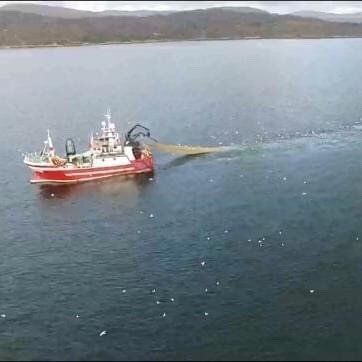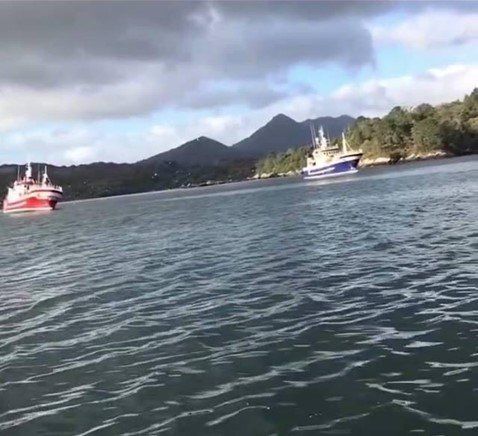Are There Still Plenty of Fish?
For decades forage fish have been taken from our oceans for commercial use , but how long can this continue? These species have other valuable roles not only in the marine ecosystem but also in other human sectors. Forage fish are small, mid-trophic level pelagic species such as anchovy, herring, krill and sprat. They account for 25-30% of global fish landings and are primarily used as fishmeal for aquaculture. However, they provide prey for predators such as seabirds and marine mammals.
A study carried out by Koehn et al . (2017) in the Californian Current found that fishing forage fish resulted in large biomass losses of seabirds and marine mammals. There are clear trade-offs currently occurring between commercial fisheries and conservation objectives. Seabirds in particular are vulnerable to this type of human activity because many of these species are specialist feeders and therefore are highly sensitive to depletion in their prey source. Forage fish therefore have a key role in marine food webs. They represent the main energy pathway through trophic levels that sustains the marine ecosystem.
Why are these tiny fish species so attractive to commercial fishing companies? Forage fish tend to accumulate in large aggregations for breeding. This makes them an easy target for large trawlers as it enables them to catch large landings over a relatively short period and at a low cost. This fast removal of an abundant critical species will lead to a population collapse if fishing rates continue to increase. This will not only cause ecological loss but will also harm the economy as there will not be any more fish to fish. Konar et al . (2019) predicts that forage fish could reach their ecological limit by 2037 if a “business as usual” approach is taken.
What benefits can the human population see from healthy forage fish populations? Ecotourism can bring in high revenue particularly for coastal communities. Predators such as whales and dolphins are highly charismatic animals which people will pay to see through whale watching tours. Konar et al . (2019) estimated ecotourism of this nature can value at millions in regional economies and billions on a global scale. Without forage fish to feed on, there will not be any of these marine mammals left for future generations.
There is an unequal distribution of economic benefit among fisheries. Small fisheries cannot compete with large commercial trawlers removing all the stocks. In Ireland, the majority of the fishing fleet is made up of vessels under 10m in length which are not large enough to fish offshore. In 2018, the Irish government implemented a ban on trawlers greater than 18m to fish within 6 nautical miles off the Irish coast. This protected not only the wildlife of inshore waters but also small fishing communities. However, the High Court has since overturned this ban, allowing boats of any size to fish anywhere. The Marine Institute recorded the landings for fishing fleet vessels both inside 6nm and outside in 2018 for several forage fish species. Vessels less than 10m took 284 tonnes (€145,289) of herring from inside 6nm while vessels larger than 18m took 3,513 tonnes (€1,288,958). Additionally, vessels >18m took 20,010 tonnes outside 6nm (€8,181,712). Small vessels cannot reach offshore waters, so how can they compete?EU Directives such as Habitat and Birds Directive and the Marine Strategy Framework Directive require important habitats such as reefs, coarse sediments, sands and muds to be maintained in good condition. These habitats are predominantly inside the 6nm of the Irish coast. Trawling and dredging are causing physical abrasion to these habitats and disturbance to the species that inhabit them.
It is critical that all parts of the marine ecosystem function effectively to enable wildlife to proliferate while generating benefits that allow human communities and economies to prosper. Currently commercial trawlers are being prioritised as the main users of the ocean. As a result, harmful trade-offs are being made which are both economically and environmentally unsustainable. There needs to be alternative management strategies implemented to prevent the collapse of forage fish populations. In Ireland this needs to start with the reinstatement of the ban on trawlers greater than 18m to fish within 6 nautical miles of the Irish coast, to protect marine biodiversity and coastal fishing communities. We welcome the Minister of Agriculture, Food and Marine Charlie McConalogue’s recent action to lodge an appeal against the High Court on their decision to overturn this ban. We hope the High Court deliver with a positive outcome. To help make this happen, sign our petition (follow the link below) to get this law reinstated. https://my.uplift.ie/petitions/stop-unsustainable-fishing-in-irish-inshore-watersReferences:
Koehn, L.E., Essington, T.E., Marshall, K.N., Sydeman, W.J., Szoboszlai, A.I. and Thayer, J.A. (2017). Trade-offs between forage fish fisheries and their predators in the California Current. ICES Journal of Marine Science , 74(9) , pp.2448-2458.
Konar, M., Qiu, S., Tougher, B., Vause, J., Tlusty, M., Fitzsimmons, K., Barrows, R. and Cao, L. (2019). Illustrating the hidden economic, social and ecological values of global forage fish resources. Resources, Conservation and Recycling , 151 , p.104456.
Marine Institute (2018). Trawl Fishing in Water Inside 6nm around Ireland. Fisheries Ecosystems Advisory Services.
SHARE THIS ARTICLE















